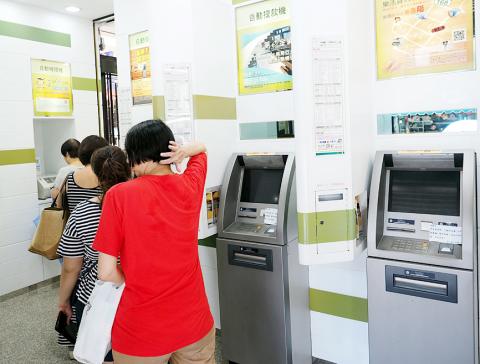State-run First Commercial Bank (第一銀行) said yesterday its clients’ rights would not be affected by an ATM-hacking incident over the weekend that saw it lose NT$70 million (US$2.2 million), as banks nationwide halted the use of ATMs made by the same German company.
The ATMs involved were made by Paderborn, Germany-based Wincor Nixdorf, a supplier of retail banking hardware, software and services.
First Commercial Bank, the banking arm of First Financial Holding Co (第一金控), said the hacking was limited to 34 ATMs at 20 branches in Taipei, New Taipei City and Taichung and the bank’s computer network was not compromised.

Photo: David Chang, EPA
It dismissed the possibility of an insider job, saying the bank has a strong firewall system and a preliminary inspection by external security experts did not find any trace of internal violations.
With more than 180 branches nationwide, First Bank has more than 700 ATMs in service. More than 300 are the same model as the ones hacked on Saturday and Sunday, the bank said.
It has suspended use of all Wincor ATMs pending an internal probe into the incident, the bank said, adding that it has conducted regular maintenance of the 10-year-old machines.
First Bank said it will cooperate with the judicial investigation into the incident.
Taiwan Cooperative Bank, the nation’s largest lender by number of branches, said it has halted service of more than 190 Wincor ATMs at branches nationwide to ensure transaction security.
Chang Hwa Commercial Bank (CHB, 彰銀) said it has 49 Wincor ATMs and has suspended the use of 39 of them.
The other 10 are inside three of its branches, and CHB said it would step up oversight of the ATMs’ functions.
Hua Nan Commercial Bank (華南銀) said it has 89 Wincor ATMs and was evaluating whether to suspend their use.
The Financial Supervisory Commission (FSC) asked First Commercial Bank to investigate all the ATMs immediately after the hacking was reported.
“The money stolen has nothing to do with deposits, bank clients’ rights would not be affected,” Banking Bureau Director-General Austin Chan (詹庭禎) told a new conference yesterday.
The commission has also requested banks to inspect their ATM fleets to prevent a similar occurrence in Wincor models.
About 20 percent of domestic banks’ ATMs use the same Wincor model, Chan added.
Banks should check their security controls over these machines and decide if they need to be replaced, Chan said.
The commission has encouraged the development of financial technology for several years, but said companies should pay attention to security issues when developing such technology.
“After all, companies cannot deny the trend of digitalization,” Chan told reporters.
First Financial Bank said the hack was unrelated to its cardless ATM cash withdrawal service that it launched last month.
The bankers association said it would reinforce its existing security rules on ATMs, and establish a better monitoring system among computer terminals.

Taiwan is projected to lose a working-age population of about 6.67 million people in two waves of retirement in the coming years, as the nation confronts accelerating demographic decline and a shortage of younger workers to take their place, the Ministry of the Interior said. Taiwan experienced its largest baby boom between 1958 and 1966, when the population grew by 3.78 million, followed by a second surge of 2.89 million between 1976 and 1982, ministry data showed. In 2023, the first of those baby boom generations — those born in the late 1950s and early 1960s — began to enter retirement, triggering

ECONOMIC BOOST: Should the more than 23 million people eligible for the NT$10,000 handouts spend them the same way as in 2023, GDP could rise 0.5 percent, an official said Universal cash handouts of NT$10,000 (US$330) are to be disbursed late next month at the earliest — including to permanent residents and foreign residents married to Taiwanese — pending legislative approval, the Ministry of Finance said yesterday. The Executive Yuan yesterday approved the Special Act for Strengthening Economic, Social and National Security Resilience in Response to International Circumstances (因應國際情勢強化經濟社會及民生國安韌性特別條例). The NT$550 billion special budget includes NT$236 billion for the cash handouts, plus an additional NT$20 billion set aside as reserve funds, expected to be used to support industries. Handouts might begin one month after the bill is promulgated and would be completed within

NO CHANGE: The TRA makes clear that the US does not consider the status of Taiwan to have been determined by WWII-era documents, a former AIT deputy director said The American Institute in Taiwan’s (AIT) comments that World War-II era documents do not determine Taiwan’s political status accurately conveyed the US’ stance, the US Department of State said. An AIT spokesperson on Saturday said that a Chinese official mischaracterized World War II-era documents as stating that Taiwan was ceded to the China. The remarks from the US’ de facto embassy in Taiwan drew criticism from the Ma Ying-jeou Foundation, whose director said the comments put Taiwan in danger. The Chinese-language United Daily News yesterday reported that a US State Department spokesperson confirmed the AIT’s position. They added that the US would continue to

The National Development Council (NDC) yesterday unveiled details of new regulations that ease restrictions on foreigners working or living in Taiwan, as part of a bid to attract skilled workers from abroad. The regulations, which could go into effect in the first quarter of next year, stem from amendments to the Act for the Recruitment and Employment of Foreign Professionals (外國專業人才延攬及僱用法) passed by lawmakers on Aug. 29. Students categorized as “overseas compatriots” would be allowed to stay and work in Taiwan in the two years after their graduation without obtaining additional permits, doing away with the evaluation process that is currently required,